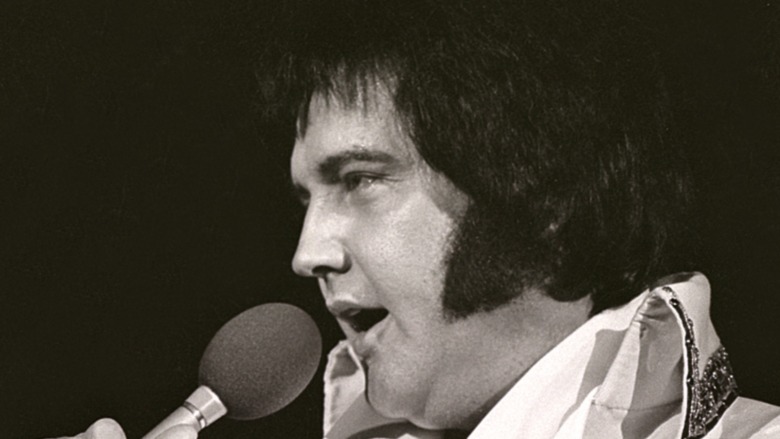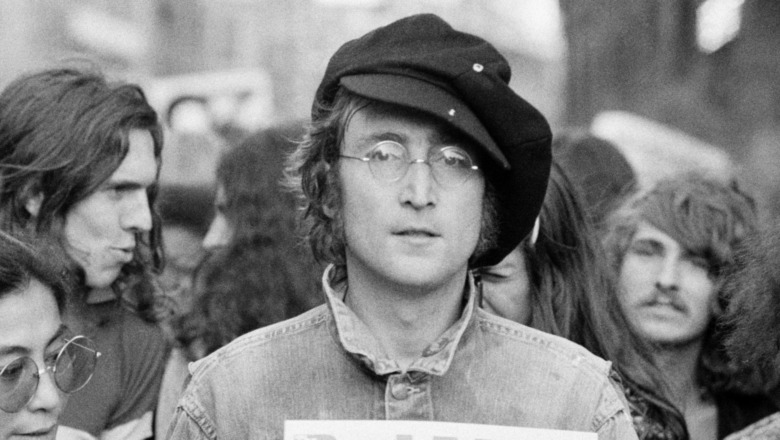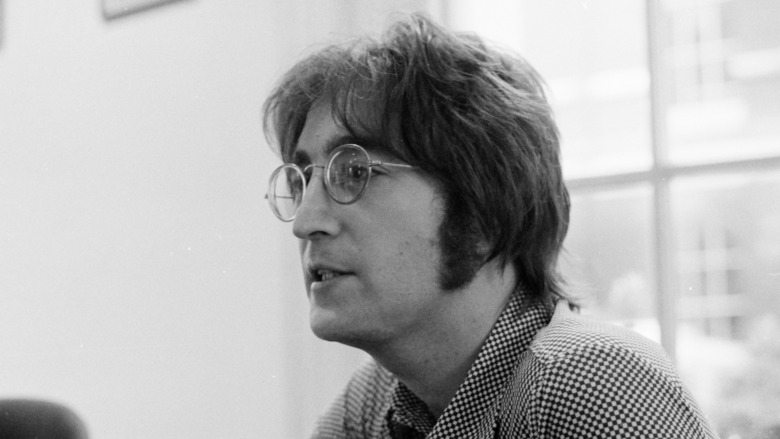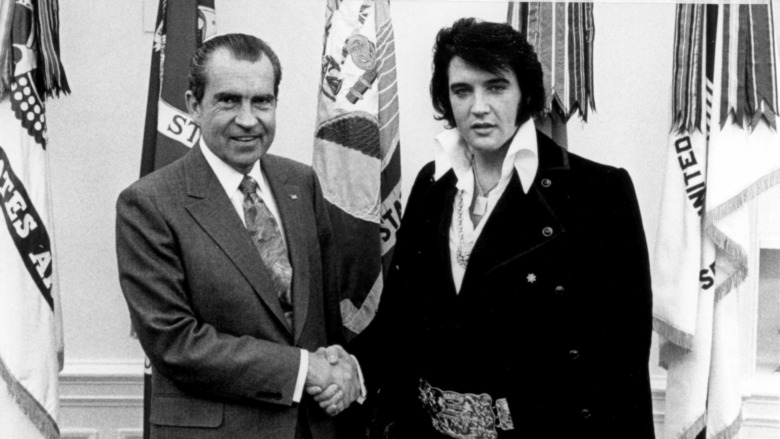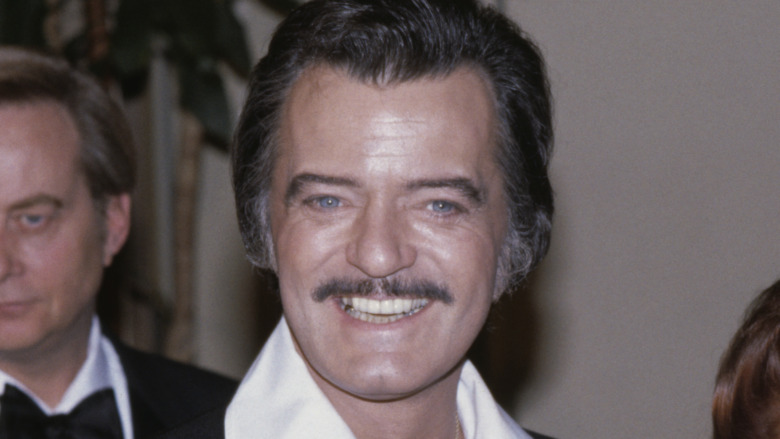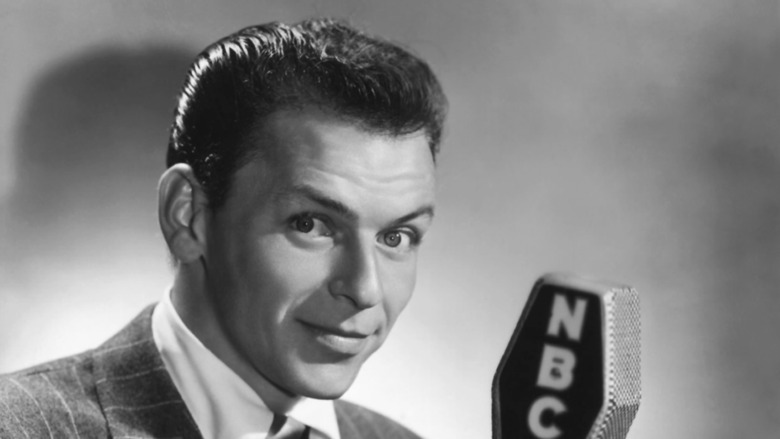Celebrities Elvis Couldn't Stand
Elvis Presley was a man of contradictions. He started his career as a sex symbol, and ended it as an overweight caricature of himself. He completely and irrevocably changed the face of popular music, and went on to spend a decade making mediocre and forgettable movies. He famously volunteered to help Richard Nixon fight the War on Drugs, according to Smithsonian, yet was himself addicted to prescription medication.
The same could be said of The King's personal relationships, too. Though he was known to be intently devoted to those he loved, he also had a short temper, and he had little patience for those he didn't like. What's more, he carried out public feuds with other celebrities who managed to get on his bad side in one way or another. Some of those beefs stemmed from political differences, others from perceived personal slights, and still others arose from petty jealousy.
Here are the stories of three celebrities Elvis couldn't stand.
Elvis hated John Lennon for his anti-war views
The careers of Elvis Presley and John Lennon took similar trajectories, in that both were two of the biggest names in music — and in popular culture as a whole — at roughly the same time. Further, both men were big while the Vietnam War was going on.
To say that the war was divisive is an understatement. Attitudes about the war extended beyond the well-publicized public demonstrations and the entire genre of music that protested the war. Public figures were to quick to line up on either side of the debate as well. Celebrities like Jane Fonda and Mohammed Ali publicly opposed the war, while others, like John Wayne, supported it.
Lennon was steadfastly opposed to the war in Vietnam, and made no secret about it. Presley, however, supported the war, according to The Express, and was a big fan of then-president Lyndon Johnson, whom Lennon hated for going all-in on the war.
When the two men finally met at Graceland in 1965, their conflicting attitudes about the Vietnam war quickly came to the surface.
John Lennon dissed Elvis Presley in his own home
No sooner had the Beatles entered Elvis' home than the tension between the two became apparent, said author Chris Hutchins, via The Express. "[Elvis'] dislike of the pacifist Beatle was born from the night I took the Fab Four to his house for their first — and last — meeting," he said.
Lennon also threw in an unveiled jab at the state of his host's career at the time. "John asked what had happened to the old rock 'n' roll Elvis, who at that point was mainly singing the soundtracks to his films. He was half-joking but he meant it," Hutchins said.
Elvis, for his part, laughed off the insult, but the cold atmosphere permeated the room from that moment on. That night, the men also picked up their guitars and started jamming, providing a momentary relief to the tension in the house.
Still, when all was said and done, the meeting did little to cool the frosty relations between the two, with Lennon reportedly saying of the meeting that he was as excited to have met Elvis as he would have been if he'd met Englebert Humperdink.
Elvis took his hatred of John Lennon all the way to the White House
Elvis wasn't prepared to just stew about John Lennon, the Beatle's anti-Vietnam War stance, and the personal slight Elvis had suffered in his own home. He wanted Lennon gone. As in, out of the USA. What's more, he actually went to none other than the President of the United States to get action.
To set the scene: Presley wasn't the only person keen to have Lennon silenced. The federal government wasn't exactly thrilled with Lennon's anti-war sentiments, either, and tried valiantly (and failed) to have him deported, according to NPR News. Elvis himself wanted the Beatles gone, too. And on December 21, 1970, the King met none other than President Richard Nixon, according to Vox. There, he tried to convince the POTUS to find a way to get rid of Lennon and the Beatles.
"The Beatles had been a real force for anti-American spirit. [They] came to this country, made their money, and then returned to England where they promoted an anti-American theme," Elvis said at the time.
Again in 1971, Elvis tried to get someone in power to get rid of the Fab Four. Touring the offices of the FBI, he told then-director J. Edgar Hoover that "the Beatles laid the groundwork for many of the problems we are having with young people by their filthy unkempt appearances and suggestive music."
Elvis famously shot his TV when Robert Goulet was on
Elvis and his contemporary, crooner Robert Goulet, couldn't have been more different. The former was a boundary-pushing, controversial Rock & Roll pioneer, the latter an inoffensive, ballad-singing performer whose presence wouldn't be unexpected on "The Lawrence Welk Show."
Legend has it that the short-tempered Elvis had little patience for seeing Goulet on TV, and once shot one of his television sets when he saw the crooner perform.
As The Express noted, Elvis' estate is actually rather proud of the incident — or at least, his caretakers consider it a part of his history to be acknowledged, rather than hidden away. The fully-functional TV set is now on display at Graceland.
The supposed beef between Goulet and Elvis may have been overblown, however. Goulet, for example, would later call Presley a "personal friend," as Lisa Rogers writes in her blog. And as for shooting a TV whenever Goulet was on? Presley reportedly did that to scores of TVs, and it had less to do with Goulet himself and more to do with the King's short fuse. He was also known to fire at the TV when other popular singers, such as Frank Sinatra or Mel Torme, appeared. Elvis' handlers kept scores of spare TVs around in case their boss happened to shoot one, according to The Vintage News.
Elvis didn't like Frank Sinatra, at first
By the middle 1950s, Rock & Roll was becoming a thing, with pioneers like Elvis, Bill Haley, and Chuck Berry bringing a new form of music to the masses, and teenagers eating it up. This presented something of a problem for old guard musicians like Bing Crosby, Perry Como, and the like. Careers were threatened. Concerns were raised about what effect the new form of music was having on the morality of America's youth. Frank Sinatra, for his part, basically called Rock & Roll garbage.
"It fosters almost totally negative and destructive reactions in young people. It smells phony and false ... It is sung, played and written for the most part by cretinous goons," he said, via The Express.
Elvis wasn't about to brook being called a "cretinous goon" by Old Blue Eyes. "If I remember correctly he was also part of a trend. I don't see how he can call the youth of today immoral and delinquent," said Elvis.
The two seem to have buried the hatchet eventually, at least professionally; Elvis appeared on stage with Sinatra in 1960 for an episode of Frank's TV show, reports Smooth Radio.
